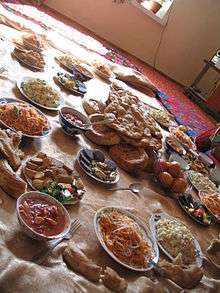Dastarkhān
A dastarkhwān (Perso-Arabic alphabet : دسترخوان, Kyrgyz: дасторкон, Hindi: दस्तरख़्वान, Kazakh: дастарқан, Bengali: দস্তরখান, Uzbek: Dasturxon) or dastarkhān, is the name used across South Asia and Central Asia to refer to the traditional space where food is eaten.[1][2][3] The term may refer to the tablecloth which is spread on the ground, floor, or table and is used as a sanitary surface for food, but it is also used more broadly to refer to the entire meal setting.[2][3] The Mughal Indian cookbook Dastarkhwan-e-Awadh, which details the Awadhi cuisine of Lucknow, emphasized the importance of the dastarkhwan.[4]
Dastarkhwan is a Turkic word meaning "tablecloth".[1][3] It is used in many other languages of the South-Central Asian region such as Balochi, Bengali, Urdu, Sindhi, Hindi, Kyrgyz, Kazakh, Uzbek, Turkmen, and Pashto.[5][6]
See also
- Central Asian cuisine
- South Asian cuisine
References
- Ken Albala. Food Cultures of the World Encyclopedia: Four Volumes ABC-CLIO, 25 mei 2011 ISBN 978-0313376276 p 49
- Suad Joseph, Afsāna Naǧmābādī. Encyclopedia of Women & Islamic Cultures: Family, Body, Sexuality And Health, Volume 3 BRILL, 2003 ISBN 978-9004128194 p 285
- Glenn Randall Mack, Asele Surina. Food Culture in Russia and Central Asia Greenwood Publishing Group, 1 jan. 2005 ISBN 978-0313327735 p 39
- Everaert, Christine (2010). Tracing the Boundaries Between Hindi and Urdu: Lost and Added in Translation Between 20th Century Short Stories. Brill Publishers. p. 75. ISBN 9789004177314.
- Brice, Nathaniel (1864). A Romanized Hindustani and English Dictionary Designed for the Use of Schools and for Vernacular Students of the Language. Trübner & Co. p. 66.
- Yates, William (1855). Introduction to the Hindustani Language: In Three Parts, Viz. Grammar, Vocabulary, and Reading Lessons. Calcutta: Baptist Mission Press. p. 128.
